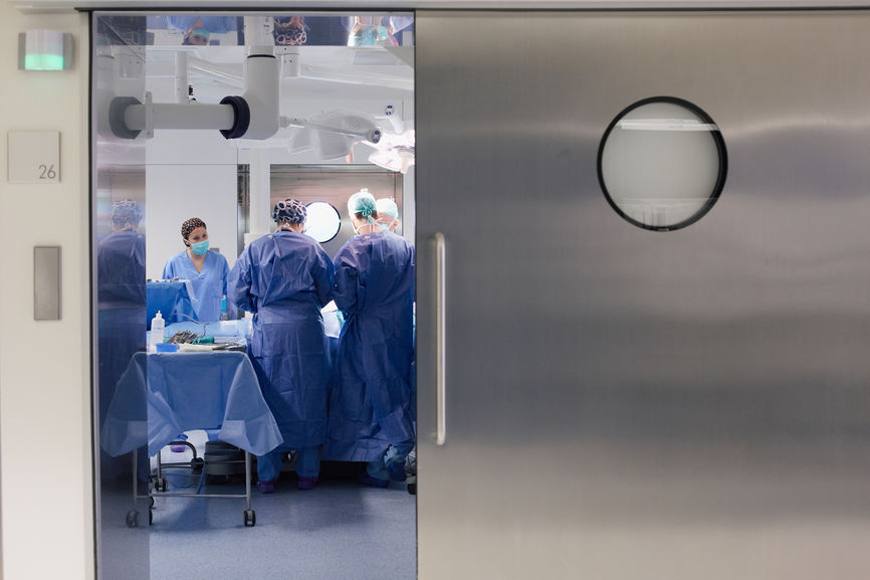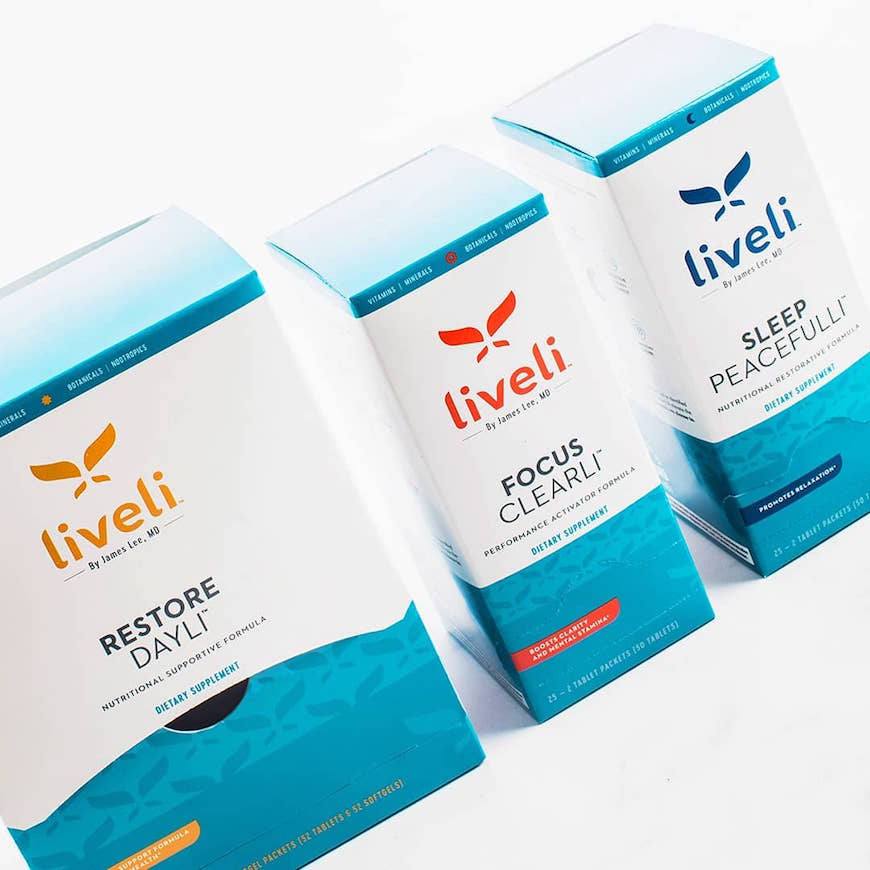Inside a Doctor’s Quest to Repair His Own Cognitive Decline—and Revolutionize Brain Health in the Process
Not if power couple James Lee and Tess Mauricio (both MDs) have anything to do with it. The anesthesiologist and dermatologist, respectively, just launched a comprehensive supplement system, Liveli, with the aim of using a multivitamin-nootropic-sleep aid combo to support brain health. While the just-launched brand can't make any preventative claims due to regulation laws, the duo is confident their 70-nutrient (yep—seventy) line has what the brain needs to function as best as possible.
And for Drs. Lee and Mauricio, founding this company was extremely personal: At 41, Dr. Lee collapsed in the operating room due to what he later found out was a brain tumor. In the year and a half that followed, he experienced sharp cognitive decline, until he was barely able to function. Here, he and his wife share the emotional story that led them on their quest to pin-point exactly what the brain needs to function at full capacity.

{{post.sponsorText}}
Keep reading to learn about the life-altering moment that caused 2 doctors to devote their careers to brain-health research.

The moment that changed everything
As one of the leading anesthesiologists in the country with degrees from Yale and Stanford, Dr. Lee was used to being on top of his game. So it was a shock when, in 2010, he found himself in the operating room suddenly unable to function. "I heard a pop in my brain and started seeing purple," he says. "I thought I popped an aneurysm and would be dead in an hour and a half."
The only anesthesiologist around for miles, not only was Dr. Lee suddenly at risk of dying, but so was the patient on the table. "The surgeon was someone I had worked with for over five years, and suddenly I couldn't remember who he was," Dr. Lee says. "I had the [drug for the patient] in my hand, but I couldn't remember what it was for, or how to use it." At this point, Dr. Lee collapsed and fell to his knees. The surgeon called for two gurneys—one for Dr. Lee and one for the patient. Amazingly, Dr. Lee still administered the correct drug dose to wake the patient up from his surgery and he recovered just fine. Dr. Lee's recovery, however, was more complicated.
The only anesthesiologist around for miles, not only was Dr. Lee suddenly at risk of dying, but so was the patient on the table.
Dr. Lee didn't rupture an aneurysm like he suspected. Rather, he had a massive brain tumor that took his own doctors approximately 18 months to find. (It turns out, they were repeatedly performing the wrong type of scans.) Over that time, Dr. Lee couldn't function at all. "I couldn't even tie my shoes or brush my teeth," he says.
Rounds of chemo helped shrink the tumor and give much of his brain function back, but returning to work was still out of the question when his doctor told him there wasn't anything else he could do. "He told me, 'Welcome to your new normal,'" Dr. Lee recalls.
"For six months, I contemplated living a useless life. I realized purpose wasn't about money or a job. It was feeling useful. I was put on this Earth to do something positive."
The experience was trying for both Dr. Lee and his wife. What was he supposed to do with his life now? Dr. Lee fell into a deep depression. "I was only 42—I didn't want to live like that for another 40 years," he says. "For six months, I contemplated living a useless life. I realized purpose wasn't about money or a job. It was feeling useful; being a husband, father, brother, and that I was put on this Earth to do something positive." He decided not to accept his fate. "I wanted to get better. And I knew I couldn’t get better without giving my body exactly what it needed."

The supplement system that's revolutionizing brain health
Dr. Lee and Dr. Mauricio's quest to find the nutrients Dr. Lee would need to return to full speed led them to a group of 70 power players that work together to boost brain health. When asked what the standouts are, Dr. Lee is unable to choose. "They all are important and work together," he says. "Ironically, I studied this all at the molecular level at Yale."
"Anesthesiologists are top experts on how the brain works because they have to be able to take the brain away and back from consciousness," Dr. Mauricio adds. "Everything in the [Liveli] line are nutrients that the body needs from food to function fully. Not only do your supplemental needs change daily because what you eat changes daily, but you'd have to be eating so much to get all the nutrients. Liveli makes sure all your bases are covered."
All 13 vitamins are included in the line as well as magnesium, zinc, calcium, and omega-3 fatty acids. "Omega-3s are the building blocks for neurons," Dr. Lee says. In the daily vitamin (called Restore), ingredients such as turmeric, cayenne, ginseng, and immunity-boosting rosemary are all included.
The Focus blend has green tea extract, ginger, dl-phenylalanine (two types of amino acids that fight depression) and l-tyrosine (which increases dopamine—the "happiness hormone"—in the brain). "Many people tell us the supplements help them taper off their anti-depressants," Dr. Mauricio says. The Focus blend also has bacopa, an Ayurvedic herb extract common in nootropics linked to increasing focus. Dr. Lee says the supplement's overall nootropic effects last for about four hours. Some people take it in the afternoon so their mind doesn't start to wander at the end of the work day.
"Most nootropics on the market are crafted to get your brain going as fast as it can, like a race car. But at the end of the race, a car gets taken into the shop and repaired. Your brain needs that, too."
The last product in the line is a Sleep blend, made with folate, magnesium, gut-supporter l-glutamine, melatonin, and several stress-busting adaptogens. "During sleep, your brain is very active—you're just not conscious of it," Dr. Lee says, adding that deep, restorative sleep is when the brain's neurons are synchronizing and working together to repair and restore. "Most nootropics on the market are crafted to get your brain going as fast as it can, like a race car. But at the end of the race, a car gets taken into the shop and repaired. Your brain needs that, too."
So, does Liveli's line work to treat Alzheimer's, dementia, and other brain disorders? While it could help, Dr. Lee says not to expect a miraculous cure. "By the time those symptoms appear, you're about 12 years too late for treatment," Dr. Lee says. "That's why, even though billions of dollars are put toward drugs for dementia, [they] don't work—it's too late."
Liveli is meant to be used as a preventative measure, though again, the brand is legally unable to make that claim. "The biggest thing you can do to prevent dementia is increase blood flow to the brain though exercise and getting nutrients that help like vitamin K, calcium, and resveratrol," Dr. Mauricio says. "Your brain is designed to shut off blood flow to the parts of the brain that aren’t working," Dr. Lee adds, explaining the importance.
Now, after launching the line, Dr. Lee says that doing so has done more than boost his brain health—it's helped restore his sense of purpose. Because treating his own condition was never the end-game: Drs. Lee and Mauricio want to help the world.
Here are some other ways to boost brain health. Plus, the 5 types of brainwaves—and how to tap into them.
Loading More Posts...